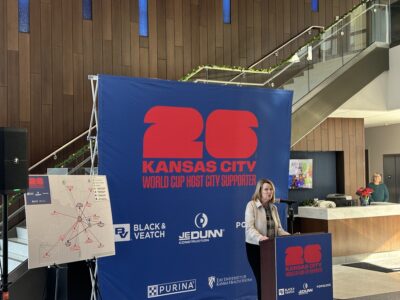Mills hopes new book will impart message of unity to ‘seventh generation’

photo by: Austin Hornbostel/Journal-World
Billy Mills, a gold medalist in the 1964 Tokyo Olympics and a former student at Haskell and the University of Kansas, was the featured speaker at Haskell's commencement ceremony Friday, May 3, 2024.
When the United States government established the Red Cloud Agency in 1871, the predecessor of the modern Pine Ridge Reservation, the Oglala Lakota leader Red Cloud wanted one B.B. Mills, a white man, to serve as his agent.
The chairman of the Board of Indian Commissioners denied the request, writing that because Mills had a Lakota wife and Lakota children, he was too enmeshed in the Indigenous community to “have either the capacity or the inclination to do any serious work for the salvation of the Indians” and his appointment would risk “perpetuating past evils” (as quoted in The Wyoming History Journal).
Mills died not long after the appointment was rejected, and his widow, Sally Bush Mills, was part of Crazy Horse’s band that surrendered at the Red Cloud Agency six years later.
In short, the ancestors of Billy Mills — an Olympic hero with Lawrence ties, but also the great-grandson of B.B. and Sally Bush Mills — bore witness to pivotal moments in the course of Lakota interaction with the United States.
Speaking of the broader history of his people and others, Billy Mills said, “Conditional treaties were signed. However, those roads became misleading very quickly, cluttered with broken treaties, boarding-school trauma, land theft and genocide.”
That trauma compounded in the ensuing decades, Mills said, and “our elders said it would take seven generations to heal.”
Tuesday’s publication of “Wings of an Eagle: The Gold Medal Dreams of Billy Mills” — a children’s book that retells Mills’ journey from growing up on the Pine Ridge Reservation to winning a gold medal in the 10,000-meter run at the 1964 Summer Olympics — is an effort by Mills to positively influence current students who, he said, constitute the “seventh generation” for the Lakota and other tribes.
Mills said he was inspired by reading about Crazy Horse over the years; in addition, he noted, Sitting Bull said, “Let us put our minds together and see what life we can make for our children.”
And Mills’ own father used to tell him, “You have a broken soul, son. Find your dream. It’s the pursuit of a dream that will heal you.”
“I wanted some way to convey that everybody’s dream in that classroom can be achieved, and the most powerful tool in achieving it is them having the dream and believing in the dream, and secondly, is by everybody understanding each other’s diversity,” Mills told the Journal-World. “… Collectively supporting one another, the generations before, the generations that are seventh generation and on, they truly will choreograph the horizon of America’s future.”
The book was co-written by Mills, who attended the Haskell Institute and University of Kansas before his Olympic glory (and is now the namesake of a Lawrence middle school), and author Donna Janell Bowman, with illustrations from S.D. Nelson.
Mills said Nelson was one of his heroes. Nelson made use of the style of late-19th century ledger art created by Indigenous people across the Great Plains.
“It’s very action-oriented, with the background,” Pat Mills, Billy Mills’ wife, said. “And it works perfectly with his book.”
As for Bowman, she came to Billy and Pat’s home in Sacramento, California, with her son and impressed them with her “sensitivity” and “in-depth research.”
“I felt that took so much time, the research she had to do, that she got to know, maybe, me totally,” Billy Mills said. “I’m half Lakota, I’m half white. And she portrayed me so accurately, but I felt that that was possible and it fit my concept of global, national, local unity.”
He said that Indigenous people have told him, “She got it.”
“The first time I read the book, I cried,” he said, “not because of little Billy and the stories, but because Donna Bowman captured the sacredness of the spirit I was trying to portray to young children in the book, the power of ‘we are one.'”
He recounted, as one of the many ways that message has been reflected in his own life, his experience of leaving the Black Hills, “the heart of everything that is” for the Lakota, and then on his way into Japan for the fateful Olympics seeing Mount Fuji and realizing it filled the same role for the Japanese.
On that trip, of course, Mills became the first American to win the 10,000 meters in a canonical Olympic moment when he made a late surge past Ron Clarke of Australia and Mohammed Gammoudi of Tunisia, immortalized by Dick Bank’s commentary: “Look at Mills! Look at Mills!” Mills is still the only American to have taken gold in the event, 60 years later.
Mills, who turned 86 on Sunday, remains quite busy. He co-founded the charity Running Strong for American Indian Youth, which on its website says that Mills travels more than 300 days a year and “visits Native American communities throughout the U.S. and speaks to youth about healthy lifestyles and taking pride in their heritage.”
He was back in Lawrence in May, when he gave the commencement address at Haskell’s graduation.
“I’m home when I’m here (in California),” he said. “I go back to Pine Ridge, I’m home, I sense the culture, the traditions, the spirituality of Lakota. I go to Lawrence, and I see this growing sacredness of unity through diversity, and I’m home.”
In keeping with the value he places on those sorts of cultural exchanges, he and his family will attend the Olympics in Paris, where he hopes to meet as many Olympians as possible from around the world.
“We might be getting ready to turn off the light and put the book away we’re reading at night and it’s midnight,” Mills said. “Well, it’s noon in the Maldives and we get a text from an Olympic colleague of mine. We have friends in multitudes of countries throughout the world, and because of the Olympics we can touch and meet a friend’s friend in every country on the planet.”
In addition, Mills will be donating his Olympic warmup suit to the Olympic Museum, providing for public consumption a memento of the victory that helped send him down this path in the first place.

photo by: AP Photo/File
FILE – In this Oct. 14, 1964, file photo, U.S. Marine Lt. Billy Mills pulls off a stunning upset by winning the 10,000 meters Olympic race in Tokyo. Mills set an Olympic record 0f 28:24:4, and was the only American ever to win the event.






